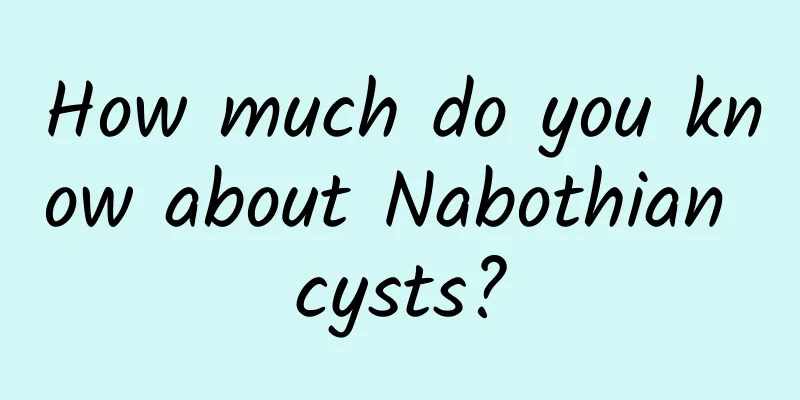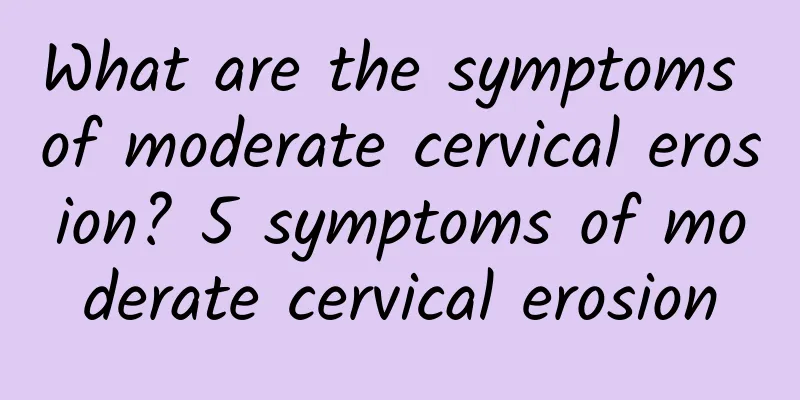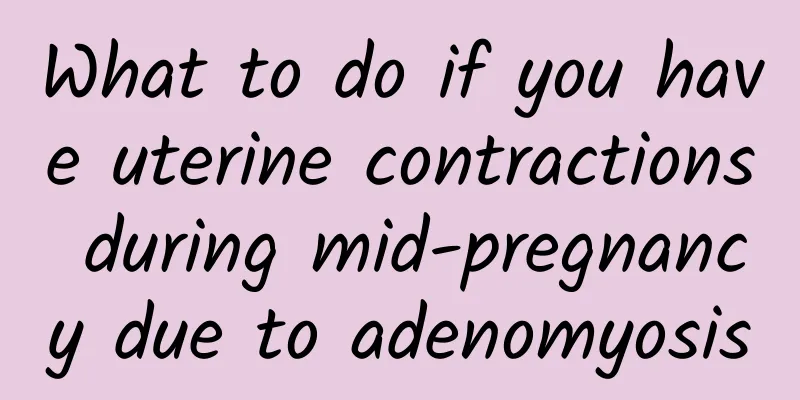How much do you know about Nabothian cysts?

|
How much do you know about Nabothian cysts? Nabothian cysts are not unfamiliar to everyone. They are what we often call cervical glandular cysts. The cysts are generally small and scattered, and can protrude from the surface of the cervix. The small ones are only the size of millet grains, and the large ones can be as big as corn grains. They are bluish-white and may be accompanied by erosion, but they are also common in cervixes with smooth surfaces. The following is some common knowledge about Nabothian cysts. The fundus or posterior wall of the uterus of patients with cysts is bulging, and there is a local cystic feeling. It can be divided into three types: subserosal, intramural and submucosal. If it is a pedunculated submucosal cyst, it can sometimes protrude outside the cervical os. Pathological examination shows that the cyst wall originating from the mesonephric duct is mostly composed of columnar or stratified squamous epithelium, while the cyst wall originating from the paramesonephric duct is mostly formed by ciliated columnar epithelium. The symptoms of congenital cervical Nabothian cyst are mostly not obvious. Sometimes a lump can be felt in the lower abdomen. The cervical glands have secretory functions and can secrete mucus. They can also be discharged through the glandular duct openings, participating in the formation of some "leucorrhea". During the healing process of cervical erosion, if the new squamous epithelium covers the cervical glandular duct openings or extends into the glandular ducts, it will cause blockage of the glandular duct openings. Nabothian cyst is a common disease in women of childbearing age. It is mostly caused by cervical injury due to childbirth, abortion and surgery, or local bacterial infection due to long-term stimulation. It can also be transformed from acute cervicitis. Cervical retention cyst has a certain relationship with the incidence of cervical cancer. Cervical glandular cyst is caused by chronic inflammation of the cervix, which causes the glandular duct and surrounding tissue to proliferate and squeeze and block the glandular opening, causing the glandular secretions to be retained inside and causing the glandular cavity to expand, forming cystic tumors of varying sizes. In daily life, we should avoid damaging the cervix during childbirth. If cervical lacerations are found, they should be sutured in time and antibiotics should be used. Pay attention to hygiene during menstruation, abortion and puerperium. Sexual intercourse and bathing should be strictly prohibited during menstruation and after childbirth to prevent pathogens from taking advantage of the situation. Pay attention to physical exercise, pay proper attention to nutrition and hygiene, and ensure physical and mental health. |
<<: What are the dangers of thick endometrium?
>>: Is premature ovarian failure hereditary?
Recommend
What harm will abortion bring to female friends?
In today's society, more and more people choo...
How long after a biochemical abortion can I have sex? See what the doctor says
After a biochemical miscarriage, your physical he...
Can pelvic inflammatory disease be transmitted through bed sheets?
Now many people know that pelvic inflammatory dis...
Predisposing factors for acute pelvic inflammatory disease
Acute pelvic inflammatory disease is more common ...
What are the symptoms of spontaneous abortion
Spontaneous abortion is a type of abortion that i...
Unexpected! 15 small actions to burn calories
Have you ever had the experience of "wanting...
Should I remove myoma or have myomectomy at the age of 50?
When a 50-year-old woman faces uterine fibroids, ...
Why do you need to do a gynecological examination before abortion?
Although modern medicine is very advanced and art...
What are the tests for Bartholinitis?
Bartholinitis is one of the common gynecological ...
How to prevent endometrial tuberculosis
Nowadays, women are very impulsive, so they have ...
What are the consequences of ovarian cysts?
What are the consequences of ovarian cysts? Nowad...
Let's analyze the causes of irregular menstruation in women
There are more and more women with irregular mens...
Can Traditional Chinese Medicine Treat Adenomyosis?
Can Traditional Chinese Medicine Treat Adenomyosi...
The most professional hospital for congenital absence of vagina
How to choose the most professional hospital for ...
How much does it cost to treat uterine fibroids? Common symptoms of uterine fibroids
First of all, you should know that there are many...









